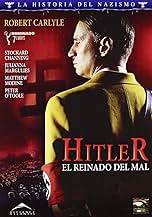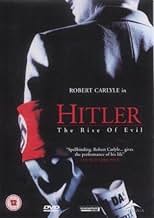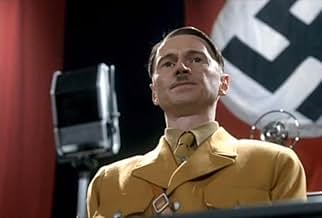Hitler: A Trajetória do Demônio
Título original: Hitler: The Rise of Evil
Uma inclinação única, traçando o perfil da vida de Adolf Hitler quando criança e sua ascensão nas fileiras do Partido Nacional Socialista dos Trabalhadores Alemães antes da Segunda Guerra Mu... Ler tudoUma inclinação única, traçando o perfil da vida de Adolf Hitler quando criança e sua ascensão nas fileiras do Partido Nacional Socialista dos Trabalhadores Alemães antes da Segunda Guerra Mundial.Uma inclinação única, traçando o perfil da vida de Adolf Hitler quando criança e sua ascensão nas fileiras do Partido Nacional Socialista dos Trabalhadores Alemães antes da Segunda Guerra Mundial.
- Ganhou 2 Primetime Emmys
- 5 vitórias e 18 indicações no total
Explorar episódios
Avaliações em destaque
This is strictly for those who like their history delivered via TV movies. Addie's childhood is hashed out during the opening credits, and it's obvious from there that anything complicated about his personality is going to be overshadowed in favor of a sophomoric portrait that would be better titled: Hitler, Son of Satan. A tepid TV costume drama about everyone's favorite villain. Carlyle is mediocre in it.
I have to admit that I'm commenting this production after seeing the first half only.But it's pretty clear to see where this is going. Now, the directing is not bad, the acting pretty good, but the script could be the work of a six year old kid (no offense to kids everywhere) who has read too many comic books. Adolf Hitler was not someone I would have wanted to get close to, espescially in the 30's and 40's, but by all means he was not the one-sided character we get to see in this film.Nobody is! "Hitler" is so badly written that the Fürher passes as a comic book bad guy. It's typical to make him an all-the-time raging nut (which he was!) but it doesn't get beneath the surface. The childhood of Hitler is so condensed (without mentioning the historical mistakes made!) that we lose sense of what really motivated the nazy leader. Duguay has to fight the material constantly in order to make everything hold together. And where we would expect a character study, even of a very very bad person (see "Raging bull", this one works!), we get something along the birth of the penguin in Batman. Now what is right for comic books isn't correct with historical figures, and certainly not with Adolf Hitler who changed the course of history in such an infamous way. More depth and less fancy camera work would have been needed to make this believable. Not sure I will watch part 2...
An entertaining miniseries, filmed mostly in Prague and with good production values, about Adolf Hitler and his rise to power, taking him from his childhood (dealt briefly) until the night of long knives.
Unfortunately, and presumably in order to avoid any charge of creating sympathy for Hitler, the filmmakers portray him as an always angry and ranting sociopath. Yet, according to most historians, Hitler, despite being an undeniable political monster directly responsible for the death of millions of people, could be also charming and charismatic. Hitler, as portrayed by the Scottish actor Robert Carlyle, is so off putting, you wonder why anyone would decide to follow him. (In this movie, even as a child, Hitler seems to be channeling the bad seed). Some other Hitler movies have been more honest in this respect: the German film Downfall is the first movie that comes to mind, but even the little known Hollywood film from 1944 "The Hitler gang" shows Hitler as friendly and charming with his associates.
I found it also somewhat disappointing that most of the actors don't resemble their characters much: the actor playing Goebbels is the one that resemble it most; the legendary Peter O'Toole is fine in his brief turn as Von Hindenburg; Carlyle don't look a lot like Hitler; the actors playing Goering and Rohm none at all. Also unfortunate is that some major associates of Hitler like Himmler do not appear at all here, while the relatively unknown Ernst Hanfstaengl (played by Liev Schreiber) is one of the major characters here.
These objections aside, I must finally say that this miniseries is undeniably entertaining and never boring, despite being three hours long.
Unfortunately, and presumably in order to avoid any charge of creating sympathy for Hitler, the filmmakers portray him as an always angry and ranting sociopath. Yet, according to most historians, Hitler, despite being an undeniable political monster directly responsible for the death of millions of people, could be also charming and charismatic. Hitler, as portrayed by the Scottish actor Robert Carlyle, is so off putting, you wonder why anyone would decide to follow him. (In this movie, even as a child, Hitler seems to be channeling the bad seed). Some other Hitler movies have been more honest in this respect: the German film Downfall is the first movie that comes to mind, but even the little known Hollywood film from 1944 "The Hitler gang" shows Hitler as friendly and charming with his associates.
I found it also somewhat disappointing that most of the actors don't resemble their characters much: the actor playing Goebbels is the one that resemble it most; the legendary Peter O'Toole is fine in his brief turn as Von Hindenburg; Carlyle don't look a lot like Hitler; the actors playing Goering and Rohm none at all. Also unfortunate is that some major associates of Hitler like Himmler do not appear at all here, while the relatively unknown Ernst Hanfstaengl (played by Liev Schreiber) is one of the major characters here.
These objections aside, I must finally say that this miniseries is undeniably entertaining and never boring, despite being three hours long.
The best bits in this are the convincing recreations of the look of the Reichstag and other places associated with the rise of Hitler. It may involve CGI, but this is CGI that works (unlike in many much more expensive productions).
The script is ropey. Especially in the early stages the characters lecture each other with historical information they would all already know, for the benefit of viewers - a classic mistake. Later we have Hindenburg talking about defending democracy. Hindenburg was not a democrat. He believed it was his duty to serve the state and to uphold its constitution.
Many have noted that Robert Carlyle's ranting Hitler would never have come to power. He'd have been certified. Why the makers of this went for this one-dimensional treatment is a mystery.
The film suggests that the Nazis could provoke an election just by walking out of the Reichstag chamber - an over-simplification to say the least.
The scenes with the newspaper man do not ring true at all, and are an embarrassment.
It all gets very rushed once Hitler becomes chancellor. The key election after the Reichstag fire is omitted. There is no mention of the Communists and Social Democrats who were missing from the session which passed the enabling law in an atmosphere of fear. The Night of the Long Knives appears to come immediately after this, although it took place 15 months later. It's a hopeless jumble.
The script is ropey. Especially in the early stages the characters lecture each other with historical information they would all already know, for the benefit of viewers - a classic mistake. Later we have Hindenburg talking about defending democracy. Hindenburg was not a democrat. He believed it was his duty to serve the state and to uphold its constitution.
Many have noted that Robert Carlyle's ranting Hitler would never have come to power. He'd have been certified. Why the makers of this went for this one-dimensional treatment is a mystery.
The film suggests that the Nazis could provoke an election just by walking out of the Reichstag chamber - an over-simplification to say the least.
The scenes with the newspaper man do not ring true at all, and are an embarrassment.
It all gets very rushed once Hitler becomes chancellor. The key election after the Reichstag fire is omitted. There is no mention of the Communists and Social Democrats who were missing from the session which passed the enabling law in an atmosphere of fear. The Night of the Long Knives appears to come immediately after this, although it took place 15 months later. It's a hopeless jumble.
Being a fanatical semi-professional historian on WW2, and utterly fascinated by Hitler's third Reich and all it's military power, I could hardly wait for "Hitler; the rise of evil" to come out after having seen the theatrical trailer.
Heavens, I never felt so completely confused about a movie after pushing the 'stop' button on my DVD-player's remote. I simply couldn't decide whether I liked it or not.
First of all, the performances set by Carlyle and companions are quite good. A little over-acted every now and then, especially Carlyle who obviously tries his up-most to copy the "Führer" and his body-language. He acts as if he is in a theatre, and seems to forget the fact that camera's register way more details/facial expressions. Compare a real recording of a Hitler-speech with one of Carlyle's speech-scene's and you'll see what I mean.
Then comes the Historical accuracy. Not quite bad, but I kept noticing small things which obviously were incorrect. Uniforms, weapons, bread-prices, skinny-Röhm, fat Hess... not really impressive job I might say.
but one of the most compelling things about the whole film (or series, I 've seen it as a film) is the fact that it is very obvious the director desperately wants to show the world Hitler was a sick-minded, over-emotional and completely mentally unstable person. Well, I can assure you this: He absolutely had his periods of mental disturbances and ignoring the truth, especially toward the war's end. But this... I have read many, many eye-witness reports from people who lived in his presence, like Albert Speer. They all agreed on some things, namely the facts Adolf Hitler was very often a think full, correct, funny, honorable man. Hitler was the mastermind behind the Nazi's criminal and appalling Holocaust. Hitler was a criminal. A kind of person that can never be allowed to rise to power again. This is obviously the reason why the director choose to show him the way he did. However, Hitler was dangerous not because he was a monster, he was dangerous because he was so intelligent, so well-spoken. Because he was worshipped by so many, because he knew what to say to 'his' people. That was the real danger, and that's exactly what we must teach. Think of it this way: The most successful murderers and big criminals are usually the smart, well-spoken and socially established men. You wouldn't know he is a monster until you see what he has done.
I wish the director/writer added a bit more humanity to his character. But obviously they chose to show the audience Hitler changed from a normal person into a monster. Talking about stereotypes and negligence of the truth.
Overall I still found it an enjoyable movie which does achieve one of it's main goals: portraying us, the crowd, as willing sheep, especially in times of need. Ye be warned.
Rating: 6.5/10
** Note: One very imposing scene: Hitler speaks out loud his ideas in the court-yard, with Hess recording it. After awhile you get to see a different day every now and then, and every time more and more inmates cheer him from behind their bars overlooking the yard.
Heavens, I never felt so completely confused about a movie after pushing the 'stop' button on my DVD-player's remote. I simply couldn't decide whether I liked it or not.
First of all, the performances set by Carlyle and companions are quite good. A little over-acted every now and then, especially Carlyle who obviously tries his up-most to copy the "Führer" and his body-language. He acts as if he is in a theatre, and seems to forget the fact that camera's register way more details/facial expressions. Compare a real recording of a Hitler-speech with one of Carlyle's speech-scene's and you'll see what I mean.
Then comes the Historical accuracy. Not quite bad, but I kept noticing small things which obviously were incorrect. Uniforms, weapons, bread-prices, skinny-Röhm, fat Hess... not really impressive job I might say.
but one of the most compelling things about the whole film (or series, I 've seen it as a film) is the fact that it is very obvious the director desperately wants to show the world Hitler was a sick-minded, over-emotional and completely mentally unstable person. Well, I can assure you this: He absolutely had his periods of mental disturbances and ignoring the truth, especially toward the war's end. But this... I have read many, many eye-witness reports from people who lived in his presence, like Albert Speer. They all agreed on some things, namely the facts Adolf Hitler was very often a think full, correct, funny, honorable man. Hitler was the mastermind behind the Nazi's criminal and appalling Holocaust. Hitler was a criminal. A kind of person that can never be allowed to rise to power again. This is obviously the reason why the director choose to show him the way he did. However, Hitler was dangerous not because he was a monster, he was dangerous because he was so intelligent, so well-spoken. Because he was worshipped by so many, because he knew what to say to 'his' people. That was the real danger, and that's exactly what we must teach. Think of it this way: The most successful murderers and big criminals are usually the smart, well-spoken and socially established men. You wouldn't know he is a monster until you see what he has done.
I wish the director/writer added a bit more humanity to his character. But obviously they chose to show the audience Hitler changed from a normal person into a monster. Talking about stereotypes and negligence of the truth.
Overall I still found it an enjoyable movie which does achieve one of it's main goals: portraying us, the crowd, as willing sheep, especially in times of need. Ye be warned.
Rating: 6.5/10
** Note: One very imposing scene: Hitler speaks out loud his ideas in the court-yard, with Hess recording it. After awhile you get to see a different day every now and then, and every time more and more inmates cheer him from behind their bars overlooking the yard.
Você sabia?
- CuriosidadesGeli's lines when she is smoking with the driver, just after being told her uncle is "a good man", ("he's a monster... you can't imagine what he asks of me") are Geli Raubal's actual words, taken directly from her journal. Allegedly, Adolf Hitler drew a series of pornographic sketches of her, titled "Miss Raubal in close-ups and angles to which any professional model would decline posing for."
- Erros de gravaçãoAdolf Hitler did not beat his dog out of frustration at the trenches, the dog was actually a beloved pet who Hitler called a 'Proper circus dog'. Hitler was also a huge supporter of animal rights in Nazi Germany and even tried to make the whole of Germany vegetarian.
- Citações
President Paul von Hindenburg: If I appoint you Chancellor, how will I answer to God?
Adolf Hitler: How will you answer to Germany if you don't?
- Versões alternativasNetwork Seven, in Australia originally aired this as a two part mini series.
- ConexõesFeatured in The 55th Annual Primetime Emmy Awards (2003)
Principais escolhas
Faça login para avaliar e ver a lista de recomendações personalizadas
- How many seasons does Hitler: The Rise of Evil have?Fornecido pela Alexa
Detalhes
- Data de lançamento
- Países de origem
- Central de atendimento oficial
- Idioma
- Também conhecido como
- Hitler: A Ascensao do Mal
- Locações de filme
- Empresa de produção
- Consulte mais créditos da empresa na IMDbPro
Contribua para esta página
Sugerir uma alteração ou adicionar conteúdo ausente






































